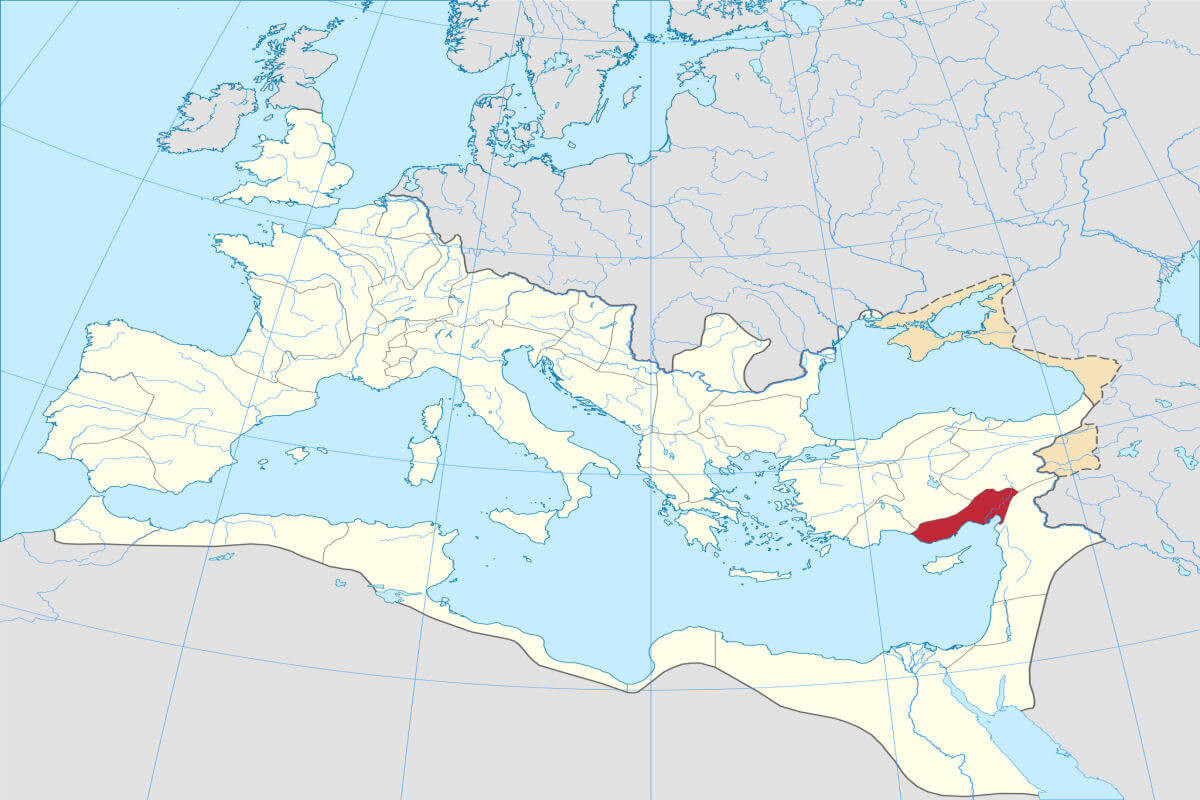Introduction
Western interest in the mountainous and coastal region of modern Turkey came with the conflicts between the Hellenistic World and the Persian Empire. Alexander the Great first brought western influence with his conquest in 333 BC but while this influence was lasting, Macedonian control was not.

Milenioscuro, CC BY-SA 4.0, via Wikimedia Commons
A map of the Roman Empire showing the province of Cilicia marked in red
Upon Alexander's death ten years later in 323 BC, the Macedonian conquests disintegrated into factional kingdoms under the rule of his generals, and Cilicia was no different.
At first, the area was under the dominion of Antigonus Monopthalmus, but conflict between Macedonian rivals soon brought the situation to a head. In 301 BC, Monopthalmus was defeated by former Alexandrian generals Seleucus and Ptolemy, and Cilicia was divided between the two of them.
Seleucus ruled in Syria, while Ptolemy controlled Egypt. This arrangement, though disputed over the next century, would last until approximately 198 BC, when the Seleucids conquered Ptolemean concerns in the territory. Despite Roman victories over the Seleucid king Antiochus III, Cilicia remained a part of his kingdom for at least another century.
Over this next century, Hellenistic influence was remarkable, and even native languages were superseded by Greek. However, the rough Tarsus mountain regions and the people who occupied them were never truly brought under control, and they remained virtually independent of Seleucid authority. As the dynasty waned in direct relation to the rise of Roman influence, these Isaurii peoples began to develop their own culture based on piracy.
While both Roman and Seleucid governments tried to suppress some pirate activity, some trade was necessary to allow for slave trafficking; a vital component of the ancient economy. By the early 1st century BC, however, piracy was out of control on the Mediterranean, and as Roman power pushed east from Macedonia, conflict was inevitable.
Moderate excursions were made against the pirates in 102 BC by Marcus Antonius (grandfather of Mark Antony), and later by his son of the same name (Antony's father) in the mid 70's BC. Julius Caesar also had personal experience with the pirates in 79 BC when he was captured for ransom on a trip to Rhodes. Upon buying his freedom he returned with a fleet, then captured and crucified his captors, but the pirate menace continued.
As the Seleucid kingdom broke apart in the 80's and 70's BC in the wake of Mithridates' wars, the pirates grew more brazen. Rome's attempts to eliminate them had to grow more serious.
Publius Servilius Vatia was appointed to command the coming attack, and he made considerable gains against them. As he limited pirate attacks to local shores, attacking the coasts of Italia actually expedited their own permanent defeat with the emergence of Pompey.
Pompey arrived in Cilicia in 67 BC with tremendous power to act in any jurisdiction against the Cilicians. With an enormous naval fleet, Pompey swiftly completed the progress of Vatia (who was later awarded the cognomen Isauricus for his work there), and within 40 days the pirate threat was virtually wiped out.
Pompey immediately took on the task of reorganizing the surviving pirates into productive Roman subjects. He established inland towns with fertile land for farming, and the former pirates soon abandoned their old ways. Though the complete pacification of the area would take another 30 years, mainly due to the Roman civil wars of Caesar, Pompey, Octavian and Antony, Cilicia quickly settled into a peaceful and productive eastern Roman province.
After Octavian's victory and ascension to the title of Augustus, parts of the province were broken up under various client kings, and the rest fell under the jurisdiction of the governor of Syria, but this arrangement didn't last particularly long.
By the reign of Vespasian (69 - 79 AD), Cilicia was re-formed as a single complete province in 72 AD. Cilicia remained in this basic provincial structure until the territorial reforms of Diocletian, but the region as a whole remained relatively unchanged for the next few hundred years.
After its initial conquests, the territory was such an ideal province that permanent legionary garrisons were never required. The neighboring provinces of Cappadocia and Syria, with the several legions stationed there, were more than adequate to provide protection and peacekeeping for Cilicia.
The province was an important provider of iron from the Tarsus Mountains, as well as limited - but high quality - silver ore. The plains area was also ideal for various forms of agriculture including grains, olives and grapes for wine.
Cilicia essentially remained a part of the Roman, then Byzantine (Romanion) Empire (Related Page: Roman Empire) until the 14th century. A brief period of Arab rule came in the 8th century, but Byzantine power was re-established 200 years later. In the heart of the crusades, Cilicia eventually passed into Ottoman control, but maintained a rich heritage of Hellenstic culture.



